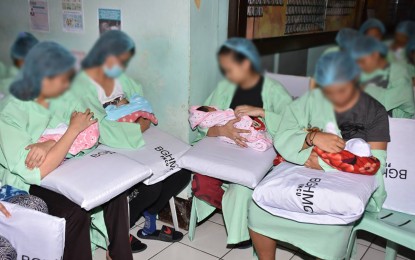
Teenage mothers in the region are encouraged to exclusively breastfeed their babies on the first six months for the newborn to have stronger immunity against illnesses. (File photo by Redjie Cawis/PIA-CAR)
BAGUIO CITY -- Alarmed by the rise in teenage pregnancy in the Cordillera, the Commission on Population (Popcom) and the Department of Health (DOH) here have intensified their programs to curb the incidence of adolescent pregnancies in the region.
"With the increasing trend of teenage pregnancies in the region, there is a need for us to redefine and refocus our interventions. Teenage pregnancy is an issue that has to be addressed by everybody, not just the involved teenagers but also their parents," outgoing director of Popcom-Cordillera, Rose Fortaleza, said on Wednesday.
Fortaleza defined adolescent mothers as those aged 10 to 19 years old.
She said based on the 2017 National Demographic Health Survey for Cordillera, 3.5 percent of women aged 15 to 19 years old or those at the beginning of the childbearing stage, have become pregnant and given birth.
To address the problem, she said they have created technical working groups and councils in the barangays that will engage the youth in skills enhancement activities and other programs to make them engage in worthwhile activities.
The activities will also include information sharing and dissemination about the negative effects of engaging in sex at an early age.
"We are targeting zero teenage pregnancy in the region by 2022. Popcom, DOH, and other concerned agencies will be working hand-in-hand to achieve this goal," Fortaleza said.
Vincent Ingen, coordinator of DOH-Cordillera's Adolescent Health and Development Program, told the Philippine News Agency (PNA) that the region recorded 3,024 adolescent pregnancies in 2018, compared to 4,008 recorded cases in 2017.
Of the 3,024 cases in 2018, Baguio accounted for 809 cases, 541 in Benguet, 367 in Ifugao, 473 in Apayao, 358 in Mountain Province, 350 in Kalinga, and 126 in Abra.
Ingen said they have been continuously conducting their health promotions and advocacies in schools and communities as part of the program to address the problem.
"These programs are ongoing. Among them are the provincial teen mom's congress, provincial adolescent health forum, regional adolescent health Congress, organization of adolescent health advocate and others," he said.
He noted that they are also training trainors who handle teenage mothers.
"Teen mothers should be handled with special and utmost care. They are very fragile and must be given special attention. That is why the people who handle them must be well-trained and know how to properly handle the situation that teen mothers are into," Ingen said.
"We have seen an increasing trend of teenage pregnancy in the region and we really need to continue to address the situation to lower the percentage of teen pregnancy in the Cordillera," he said.
The technical working groups in the provinces help educate and provide services and the commodities, such as contraceptives, to adolescents in remote areas.
He said there are several factors that lead to adolescent pregnancies.
"Marami kasing factors talaga yan, katulad ng peer pressure, pagkakaroon ng broken family, walang guidance from their parents, and of course yung curiosity nila. At that age, gusto nilang mag-explore. Without guidance, talagang magkakaanak sila ng maaga (There are a lot of factors, such as peer pressure, broken family, lack of parental guidance, and of course, their curiosity. At that age, they want to explore. Without guidance, they really are prone to get pregnant at an early age)," he said. (PNA)
